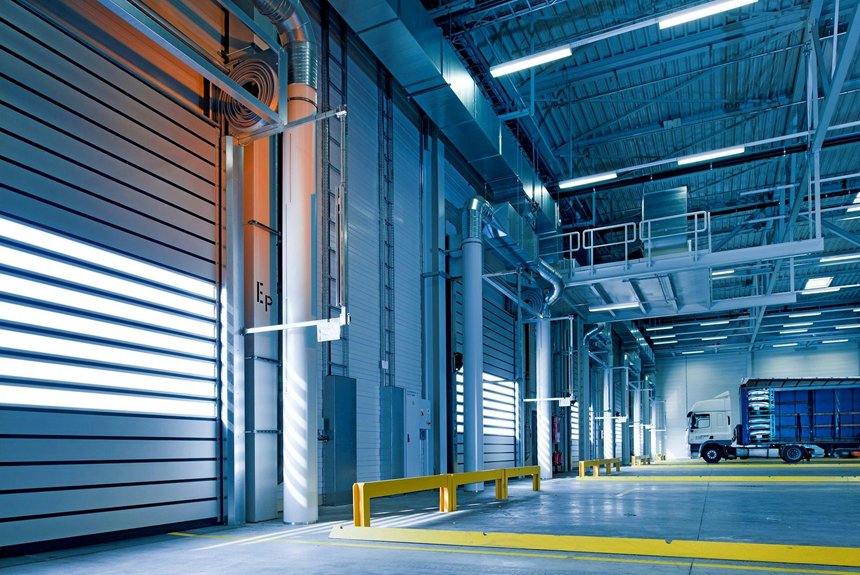If your garage door in Greensboro is making more noise than usual, you’re not alone. Noisy doors can be frustrating and may indicate underlying issues that need attention. While some fixes are simple, others require proper tools and techniques to guarantee safe, quiet operation. Understanding common causes and solutions can help you decide whether to tackle the problem yourself or call in a professional. Ready to explore effective ways to silence that noisy garage door?
Identifying Common Sources of Garage Door Noise
Garage door noises often stem from specific, identifiable issues that you can troubleshoot before calling a professional. One common cause is improper spring tension, which can cause the door to make loud creaking or banging sounds during operation. Check if the springs are evenly tensioned; uneven tension can lead to noisy, jerky movement.
Another issue is misaligned sensors, which may produce clicking sounds or prevent the door from closing fully. Ensure the sensors are aligned directly facing each other and free of dust or debris. Addressing these issues can considerably reduce noise and improve your garage door’s smooth, quiet operation.
Lubricating Moving Parts for Quieter Operation
Proper lubrication of moving parts can greatly reduce garage door noise and guarantee smoother operation. Regular garage door lubrication ensures that parts like hinges, rollers, and tracks move quietly and efficiently.
Use a high-quality silicone or lithium-based lubricant for noise reduction techniques. Avoid over-lubricating, which can attract dirt and cause more noise.
Focus on applying lubricant to the rollers’ bearings, hinges, and springs. Well-lubricated components minimize friction and vibration, leading to quieter operation.
Tightening Loose Hardware and Components
Loose hardware and components can cause significant noise and reduce your garage door’s stability, so it’s important to verify and tighten them regularly. Start by inspecting hinges, brackets, and rollers for looseness. Tighten any bolts or screws using the proper tools.
Sometimes, loose hardware affects garage door insulation, reducing energy efficiency and increasing noise. If your remote control issues persist, ensure all hardware is secure, as vibrations can interfere with signal transmission.
Regularly tightening hardware helps prevent further damage, keeps your garage door operating smoothly, and minimizes noise. Making these checks part of your routine maintenance can help extend the life of your garage door and ensure safe operation. Family owned and operated business
Replacing Worn or Damaged Rollers and Hinges
Over time, worn or damaged rollers and hinges can cause squeaking, increased noise, and uneven door movement. To restore smooth operation, consider roller replacement and hinge repair.
Worn rollers may become cracked or chipped, leading to noisy operation and faster wear on tracks. Damaged hinges can cause misalignment or sticking.
Replacing rollers involves removing old, worn components and installing new ones designed for your door’s specifications. Hinge repair might mean tightening loose hinges or replacing damaged parts.
Doing these repairs improves noise levels and ensures your garage door opens and closes smoothly. Regular maintenance of rollers and hinges can extend your door’s lifespan and reduce future problems.
Adjusting the Garage Door’s Balance and Limit Settings
To guarantee your garage door operates smoothly and quietly, you need to check and adjust its balance and limit settings regularly. Proper garage door maintenance ensures the door opens and closes evenly, reducing strain on the opener and decreasing noise.
Start by disconnecting the opener to manually test the balance—lift the door halfway; it should stay put. If it doesn’t, adjust the springs or tracks.
Next, set the limit switches so the door fully closes and opens without overextending. Correctly calibrated limits minimize strain and noise, making your garage door operate more quietly.
Regular adjustments are essential for noise reduction techniques and long-term performance.
When to Call a Professional Garage Door Technician
While some garage door issues are simple to fix with basic adjustments, you should call a professional technician when problems persist despite your efforts or if you notice unusual noises, slow operation, or difficulty opening and closing the door.
If your garage door isn’t properly insulated, it can lead to increased noise and energy loss.
Neglecting garage door safety can also pose risks, especially if components are damaged or worn.
A professional can assess and repair these issues safely, ensuring your garage door operates smoothly, reduces noise, and maintains proper insulation.
Don’t hesitate to seek expert help for complex problems or concerns about safety and insulation.
Conclusion
By regularly inspecting, lubricating, and tightening your garage door components, you can considerably reduce noise and keep it running smoothly. Replacing worn parts and adjusting settings also help prevent future issues. However, if noise persists or you’re unsure about any repairs, don’t hesitate to call a professional. To schedule your appointment with Twin City Garage Door, call us today at (336) 837-7354 or visit us online at Twin City Garage Door. Taking these steps ensures your garage door operates quietly and reliably, giving you peace of mind and a quieter home environment.

